Isang Yun Timeline
A year by year alignment of Isang Yun's life. Biographical information by Walter-Wolfgang Sparrer, based on an exhibition at the Yun House Berlin, 2011/12. The chronological list of selected works provides links for further information on those published by Boosey & Hawkes | Bote & Bock.
April 1923-March 1926: Attends a Chinese literature school in Tongyeong.
April 1926-March 1932: Attends public general-education school in Tongyeong (primary school).
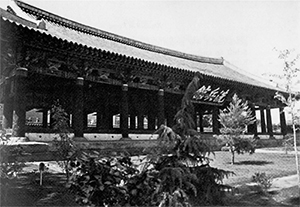
An interlude at a cinema in Tongyeong sees the first public performance of a work by Yun, then a self-taught composer.
April 1932-March 1934: Attends commercial college in Tongyeong at his father’s request.
1934/35: Work placement at his brother-in-law’s shop in Tongyeong.
Occasional travels to Seoul to take music lessons.
Prints the Korean song collection Mokdong ui norae (Shepherd’s Song) at his own expense, driven by his desire to build and strengthen Korean identity and national consciousness.
1935/36: Studies at Osaka College of Music (cello, music theory) against his father’s will. In Osaka, Yun adopts a Japanese name. When his Korean identity is disclosed, he escapes to Seoul, where he is christened as Protestant on 8 November 1936.
April 1937-March 1940: Teaches at a private primary school in Tongyeong.
April 1940-November 1941: Studies in Tokyo (counterpoint, composition).
Returns to Busan, Korea after hearing rumours about the imminent outbreak of the Pacific War.
7 Dec: Japanese attack on Pearl Harbor. U.S. entry into the war. Turning point in Pacific War and World War II in general.
1942/43: Yun takes part in a nationwide resistance movement against Japanese rule. 1943: Arrest, torture, detention in Tongyeong for two months.
Forced by the Japanese occupying forces to do fatigue duty and to exact ‘strategic’ dues from peasants in the Tongyeong area.
Persecuted again by the Japanese military police. Escapes to Seoul, where he hides under a false name.
Falls ill with tuberculosis, taken to university clinic in Seoul.
15 Aug: End of World War II. Korea is liberated from 40 years of Japanese rule. Heralding the onset of the Cold War, the Great Powers, the Soviet Union and the USA, secure their spheres of influence by occupying Korea.
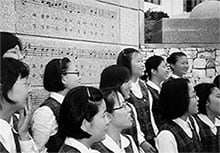
Teaches music at girls' grammar school in Tongyeong.
Composes Korean songs for children of various schools.
1946/47: Founds and directs a municipal orphanage in Busan, Korea.
May 1947-Feb 1948: Returns to girls' grammar school in Tongyeong to teach music again.
Teaches music at Busan teachers college.
15 Aug: Anti-Communist Syngman Rhee proclaims the Republic of Korea, following the US military rule in Busan. In response, Kim Il-sung proclaims the Democratic People’s Republic of Korea on 9 Sep, supported by the Soviet Union.
30 Jan: Marries Sooja Lee. Together, they take a flat in Busan. 20 Nov: Daughter Djong is born.
25 June: Tensions between North and South Korea lead to the Korean War.
1952/1953: Teaches music at secondary school in Busan.
27 July: Armistice and end of the Korean War sealing the country’s division. Seoul becomes seat of government again, albeit for South Korea only.
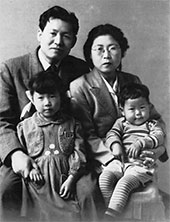
Aug 1953: Yun and family move to Seoul.
1953-1956: Teaches at various universities in Seoul. Participates in the setup of musical life in general.
1 Sep 1954: Son Ugiong is born.
11 April: Receives the Seoul City Culture Award for his 1st String Quartet and Piano Trio.
Studies in Paris at the Conservatoire National de Musique (composition, music theory).
Moves to West Berlin.
Studies at the Berlin College of Music under Boris Blacher, Reinhard Schwarz-Schilling and Josef Rufer, among others (composition, music theory, twelve-tone technique), graduating in July 1959.
Sep 1958: First visit to the International Summer Courses of Contemporary Music in Darmstadt, where he meets John Cage and Bruno Maderna among other composers.
4 Sep: Premiere of
Music for seven instruments in Darmstadt.6 Sep: Premiere of Five pieces for piano at the Gaudeamus Muziekweek in Bilthoven. German premiere on 1 Oct in Krefeld.
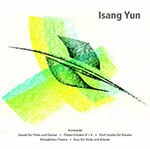
Oct 1959: Moves to Krefeld.
April: In South Korea, the regime under Syngman Rhee is forced to resign.
Nov 1960-Jan 1961: Yun stays at the Urberger Contakt-Centrum in the Black Forest, Germany (an international meeting place for artists and scholars).
May: General Park Chung-Hee seizes power in South Korea; the trade union and reunification movements are dissolved.
Sep 1961: Sooja Yun joins her husband in Germany (the children follow in 1964). Together, they move to Freiburg im Breisgau.
Travels to North Korea.
Aug 1963: Moves to Cologne.
Treaty on Basic Relations between Japan and the Republic of Korea.
Summer 1966: Two-month study and lecture tour of the USA (Tanglewood, Aspen, San Francisco, Los Angeles, Chicago, New York).
23 Oct: Premiere of
Réak at the Donaueschingen Music Festival attracts international attention and recognition.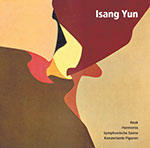
Yun is kidnapped by the Korean intelligence service and taken to Seoul. He is accused of espionage for North Korea. On 13 Dec, he is sentenced to life imprisonment at first instance.
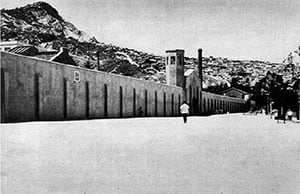
Oct 1967: Yun receives permission to compose; on 5 Feb 1968 he completes the opera
Butterfly Widow in prison.
On appeal, his sentence is commuted to 15 years imprisonment. In appellate court, the sentence is reduced once more on 13 March, this time to 10 years.
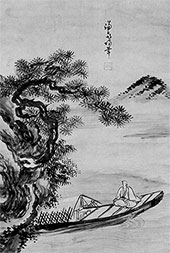
Becomes a member of the Free Academy of Arts in Hamburg.
Following international protests and the intervention of his friends as well as the Federal Foreign Office, Yun is released from prison on 24 Feb. He returns to West Berlin on 30 March.
1969-71: Teaching assignments for composition at the College of Music and Theatre in Hanover.
23 Feb: Premiere of the double opera bill Dreams: The Dream of Liu-Tung and Butterfly Widow in Nuremberg. Subsequent guest performances in Berlin, Frankfurt/Main, at the Munich Gärtnerplatztheater (1970) and the Vienna Volksoper (1972).
From 1970/71: Teaching assignments for composition at the College of Music and Performing Arts in Berlin (today’s University of the Arts Berlin).
1 Aug: Premiere of the opera
Sim Tjong as part of the cultural programme for the Olympic Games in Munich.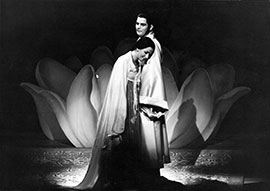
Following the abduction of opposition leader Kim Dae-jung by the South-Korean intelligence service, Yun supports campaigns of Korean exile organisations for democracy in South Korea and the reunification of the divided country.
Composer-in-residence in Aspen, Colorado.
Appointed Honorary Professor at the College of Music in Berlin.
Becomes a member of the Academy of the Arts in Berlin.
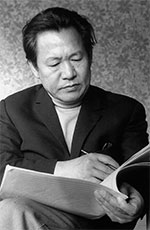
1 March: Foundation of the Forum for Democracy in Korea in Bonn, chaired by Du-Yul Song.
At a conference of exiled Koreans in Tokyo, the South-Korean intelligence service makes another attempt to kidnap Yun.
1977-85: Full professorship at the Academy of the Arts, Berlin.
Foundation of the Union of Overseas Koreans in Tokyo, an international umbrella organisation of Koreans in exile who support the cause of democracy and reunification of Korea.
Non-Korean friends of Yun found an International Solidarity Committee, or Korea Committee in Germany, merged into the Korea Association in 1994.
26 Oct: Assassination of South-Korean dictator Park Chung-Hee.
Dec: Military coup led by General Chun Doo-Hwan.
May: Massacre at Gwangju.
In response to political events in Korea, Yun composes the solo cantata Night, Be Parted based on poems by Nelly Sachs (1980) and the orchestral work Exemplum in memoriam Kwangju (1981).
Violin Concerto I in three movements based on Classical and Romantic models.
Sept: Yun concerts in both Korean capitals; the musicians include Eduard Brunner, Heinz and Ursula Holliger, Francis Traivs. Since then, an annual Isang Yun Festival has been held in Pyongyang.
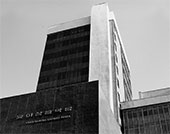
Dec: Foundation of the Isang Yun Music Institute in Pyongyang.
Honorary professorship of Tübingen University.
Oct/Nov: Composition classes in Japan and People’s Republic of China.
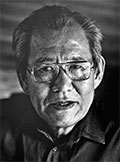
Grand Cross for Distinguished Service of the German Order of Merit from the Federal Republic of Germany.
Honorary member of the International Society for Contemporary Music.
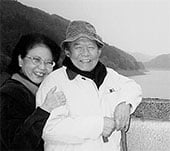
Thomas Mann Medal of the Free Academy of the Arts, Hamburg, where Yun becomes an honorary member in 1993.
May: Yun is appointed the first Guest Professor of Poetics at the ‘Mozarteum’ College for Music and Performing Arts in Salzburg.
3 Sept: Failed attempt to return to South Korea on the occasion of the Isang Yun Festival in Seoul.
Angel in Flames. Memento for orchestra; Clarinet Quintet II; Quartet for Oboe and String Trio; Epilogue to Angel in Flames for soprano, three-part women's chorus and five instruments.
Goethe Medal awarded by the Goethe Institute.
3 Nov: Isang Yun dies at the Waldkrankenhaus in Berlin-Spandau. He is buried in a grave of honour at the Landschaftsfriedhof cemetery in Berlin-Gatow.
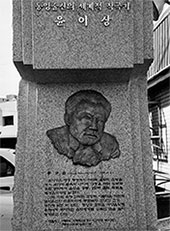
Photos (if not otherwise indicated): International Isang Yun Society, Berlin.
